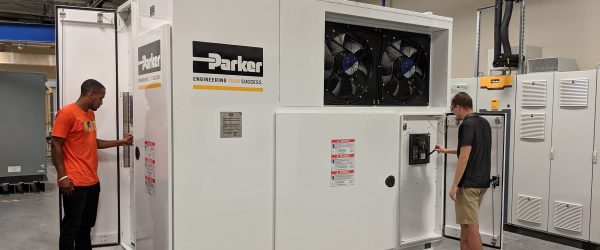EPIC receives federal grant to research electric vehicle charging solution

UNC Charlotte’s Energy Production and Infrastructure Center (EPIC) was awarded a $942,000 grant from the U.S. Department of Energy to develop an innovative solution related to curbside charging of electric vehicles.
EPIC Director Mike Mazzola stated, “This project will pilot a solution for the emerging problem of providing owners of electric vehicles charging points at or near their home or work when roadside parking is the primary option. Due to the abundance of emission-free energy from nuclear and solar resources, and state and local goals for decarbonizing transportation, Charlotte is an ideal location for this project.”
The federal grant awarded EPIC is part of an $80 million investment in advanced vehicle technologies research to enable more affordable mobility, strengthen domestic energy security, reduce the nation’s dependence on foreign sources of critical materials and enhance U.S. economic growth. This work supports the U.S. Department of Energy’s (DOE) goal to invest in early-stage research of transportation technologies that can give families and businesses greater choice in how they meet their mobility needs.
In a statement, U.S. Secretary of Energy Rick Perry said, “Improving the affordability of transportation for American consumers and businesses keeps our economy moving. By investing in a broad range of technologies, DOE is ensuring America remains at the forefront of innovation.”
EPIC will be responsible for the project management and design of unique structural and electrical upgrades to the utility light poles selected to receive the curbside EV charging infrastructure made by Eaton Corporation. EPIC will perform testing and validation of the communications, electric and structural subsystems before delivery to Duke Energy’s Mount Holly research facility for full system testing and qualification. Centralina Council of Governments will manage the process of selecting the Charlotte area government to host the demonstration and assisting in community relations during the planning and execution of the demo.
“In addition to local governments and the general public seeking greater electric vehicle charging opportunities in general, there is an ever-growing interest in broader access to charging for all members of our communities. We are especially interested in how this project can begin to address these growing concerns around equity and access to transportation choices being heard around our region,” stated Jason Wager, coordinator for the Centralina Clean Fuels Coalition and principal planner at Centralina Council of Governments.
Lang Reynolds, Duke Energy’s manager of electric transportation, said, “Duke Energy is committed to advancing adoption of electric transportation, which can drive cost savings for our customers and reduce emissions from the transportation sector. This project is an opportunity to advance one of many products and services we are developing to serve the emerging needs of our customers related to EV charging.”
Photo: EPIC researchers Nicolas Sockeel and William McKay are working on a new 1 megawatt-rated testbed for high-power components, including fast electronic vehicle chargers.